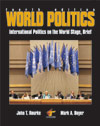

 World Politics: International Politics on the World Stage, Brief, 4/e International Law and Morality: The Alternative Approach You Be The Judge: Should We Judge Others By Our Own Standards? |
 2002 McGraw-Hill Higher Education
2002 McGraw-Hill Higher EducationAny use is subject to the Terms of Use and Privacy Policy.
McGraw-Hill Higher Education is one of the many fine businesses of The McGraw-Hill Companies.